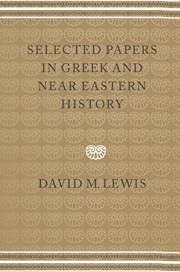Book contents
- Frontmatter
- Contents
- List of plates
- Preface
- Systems of reference
- GENERAL
- ATHENIAN
- NEAR EASTERN
- 31 The Persepolis Fortification Texts
- 32 The King's dinner
- 33 Datis the Mede
- 34 Persians in Herodotus
- 35 The Phoenician fleet in 411
- 36 Persian gold in Greek international relations
- 37 The first Greek Jew
- 38 Review of J. N. Sevenster, Do You Know Greek?
- Bibliography
- Publications of David M. Lewis
- Indexes
34 - Persians in Herodotus
Published online by Cambridge University Press: 15 January 2010
- Frontmatter
- Contents
- List of plates
- Preface
- Systems of reference
- GENERAL
- ATHENIAN
- NEAR EASTERN
- 31 The Persepolis Fortification Texts
- 32 The King's dinner
- 33 Datis the Mede
- 34 Persians in Herodotus
- 35 The Phoenician fleet in 411
- 36 Persian gold in Greek international relations
- 37 The first Greek Jew
- 38 Review of J. N. Sevenster, Do You Know Greek?
- Bibliography
- Publications of David M. Lewis
- Indexes
Summary
Toni was one of my first graduate teachers when I arrived in 1951 at what, after two years in the army, seemed only just this side of paradise, and he has been a steady support and solace ever since. It is the greatest possible pleasure to join in his birthday celebration.
This is not a wide–ranging investigation of Herodotus' interest in or attitude to the Persian Empire or the Persian character. The questions involved are about Herodotus the investigator and narrator, and are not new. They concern the methods by which he was able to know so much about that empire, and they involve the oldest questions of all: How much trouble did he take in the search for truth? Did he in fact have any conscience about the truth at all?
Historians are not unaware that Herodotus' truthfulness has been challenged from time to time, but on the whole they take no notice. To speak frankly, they have to ignore such criticisms or be put out of business, particularly when dealing with Persian history. Historians abhor a vacuum, and narrative sources on the Persian side are virtually non–existent. We only have the Babylonian texts which cover Cyrus' occupation of Babylon and the Behistun Inscription to cover the accession year of Darius. The result is that, if one is to write a narrative account of the reigns of Darius and Xerxes at all, there is || no alternative to using Herodotus' narrative as the core of that account.
- Type
- Chapter
- Information
- Selected Papers in Greek and Near Eastern History , pp. 345 - 361Publisher: Cambridge University PressPrint publication year: 1997
- 4
- Cited by



